Apps
Auto Added by WPeMatico
Auto Added by WPeMatico
The GameStop stock saga continues, Apple releases more details about its privacy changes and Qualtrics goes public. This is your Daily Crunch for January 28, 2021.
The big story: Robinhood restricts GameStop trading
Robinhood has responded to an upsurge in retail investors buying shares in companies like GameStop, AMC and Blockbuster by restricting trading on “certain securities” to “position closing only,” meaning that users can no longer buy more of the companies’ stocks. (It says it will allow “limited buys” tomorrow.)
This comes after the current buying spree — targeting stocks shorted by institutional investors and spurred by the WallStreetBets forum on Reddit — took Robinhood and Reddit to the top of the app charts.
Now, Robinhood is being hit with numerous 1-star reviews, and the move also attracted criticism from politicians on both sides of the aisle, with Rep. Alexandria Ocasio-Cortez describing it as “unacceptable” and Senator Ted Cruz tweeting, “Fully agree.”
The tech giants
Apple’s App Tracking Transparency feature will be enabled by default and arrive in ‘early spring’ on iOS — The plan is to launch these changes in early spring, with a version of the feature coming in the next iOS 14 beta release.
Qualtrics prices IPO at $30 per share, above its upgraded target range — The company sold 50.4 million shares in the process.
Twitter is already working on integrating newsletters on its site, following its Revue acquisition — It appears “Newsletters” will soon be the newest addition to Twitter’s sidebar navigation.
Startups, funding and venture capital
Workday acquires employee feedback platform Peakon for $700M — Peakon says companies have used its platform’s weekly surveys to ask more than 153 million questions since inception six years ago.
Fintech darling Nubank raises blockbuster $400M Series G at $25B valuation — The fintech company now has 34 million customers.
Flowhaven raises $16M to evolve brand licensing management beyond emails and spreadsheets — The media licensing business is a massive market, but much of the work involved is still handled manually through emails and spreadsheets.
Advice and analysis from Extra Crunch
Thirteen investors say lifelong learning is taking edtech mainstream — As learners become more multi-layered and nuanced, so have the edtech companies that back them.
Talent and capital are shifting cybersecurity investors’ focus away from Silicon Valley — Solving the cybersecurity problem will take more time and resources than we are currently allocating.
Mind the gap: E-commerce marketers should revise their TAM and SAM estimates — 2021 is going to be another glorious year for e-commerce.
(Extra Crunch is our membership program, which helps founders and startup teams get ahead. You can sign up here.)
Everything else
Smartphone sales slowed decline in Q4, with a big assist from Apple — The past year was, of course, a major blow to an industry already suffering a slide.
GM pledges to be carbon neutral by 2040 with zero tailpipe emission vehicles by 2035 — It’s a big step for a company whose products are responsible for a large percentage of global greenhouse gas emissions.
UCLA is building a digital archive of mass incarceration with a new $3.6M grant — The “Archiving the Age of Mass incarceration” effort is being led by Kelly Lytle Hernandez, director of the university’s Bunche Center for African American Studies.
The Daily Crunch is TechCrunch’s roundup of our biggest and most important stories. If you’d like to get this delivered to your inbox every day at around 3pm Pacific, you can subscribe here.
Powered by WPeMatico
The GameStop mania didn’t just drive up the stock price of a declining video game retailer, it’s also sent trading apps and others to the top of the App Store, due to record-breaking downloads. Today, the popular trading app Robinhood has become the No. 1 app overall on the App Store for the first time, followed by No. 2 Reddit, home to the r/wallstreetbets forum which drove the push to buy GameStop.
Neither app had reached as high a chart position before, according to data from Apptopia.
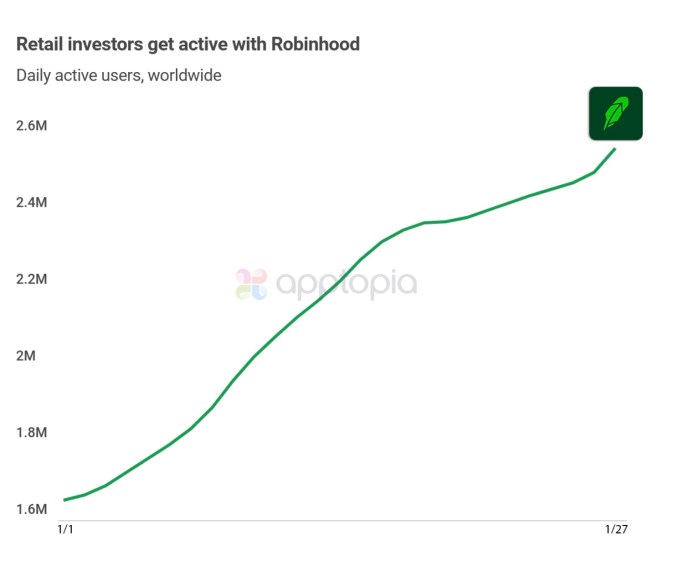
The app store intelligence firm also found that Robinhood had its best day ever in terms of single-day downloads on Wednesday, Jan. 27, 2021 when 120,000 new users downloaded the stocks app for the first time across both iOS and Android. Robinhood also broke records for its highest number of daily active users on mobile at 2.6 million.
Meanwhile, online forum site Reddit broke its download record for its mobile app, with 199,000 single-day downloads on iOS and Android, Apptopia estimates, while also climbing to No. 2 on the Overall Top Charts on the U.S. App Store.
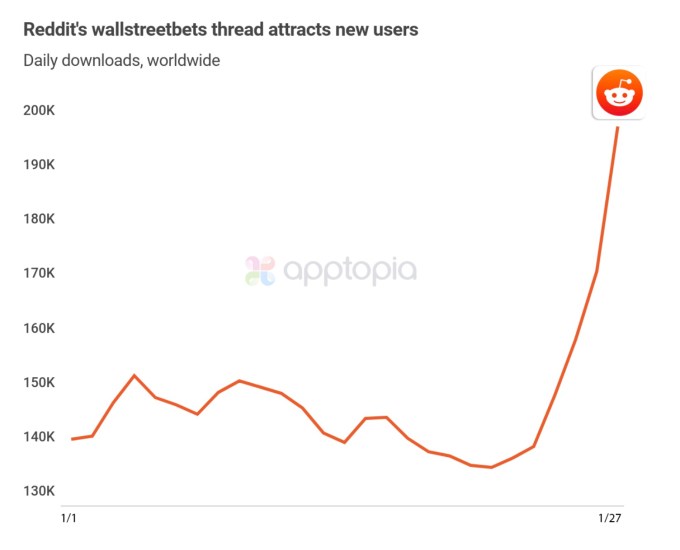
But the frenzy around GameStop and the revenge of the retail trader is boosting other, more traditional trading apps, as well. Apps like TD Ameritrade, Webull, Fidelity, and E*TRADE have benefited from the situation, with record-breaking daily users and higher chart rankings.
All four apps on Wednesday achieved their highest-ever chart position to date on the U.S. App Store, with Webull at No. 45 Overall, followed by TD Ameritrade at No. 53, E*TRADE at No. 113, and Fidelity at No. 178. (App Annie sees Webull closing Wednesday even higher — at No. 30 on iPhone. Before, it hadn’t even ranked in the top 100 free iPhone apps.)
Webull also recorded its highest number of daily active users yesterday, with 952,000, while TD Ameritrade saw a record 444,000 daily active users and Fidelity had a record of 429,000 Apptopia found.
Combined, the four apps saw 863,000 total downloads on Wednesday (Webull: 39K; TD Ameritrade: 24K; E*TRADE: 11K; and Fidelity: 12.3K).
It’s unclear how long the trading app mayhem will continue, as Robinhood has already halted the trading of “meme stocks” like GameStop, AMC Entertainment, BlackBerry, and Bed, Bath & Beyond, Koss Corporation, Express, Nokia and Naked Brand.
That hasn’t sat well with Robinhood users, who are now in the processing of assailing the app with 1-star reviews as a result, and encouraging others to the do the same.
Surprisingly, the Square-owned Cash App hadn’t yet gained from the GameStop insanity this week, Apptopia found. But it does appear to now be struggling as the Robinhood crowd began the search for another stock trading tool. This morning, Cash App’s Twitter account bio reads it’s looking into an issue with Cash App that’s “delaying some orders.”
App Annie reports some slight movement today on Cash App,as it just jumped from No. 14 overall to No. 12.
Powered by WPeMatico
IAC has acquired Confide, the encrypted mobile messaging that once made headlines for its use by White House staffers during the Trump administration. The deal, which closed on Dec. 1, 2020 but was not publicly announced, sees Confide joining Teltech, the makers of spam call-busting app Robokiller, which itself had joined IAC’s Mosaic Group by way of a 2018 acquisition.
Teltech confirmed the Confide acquisition, but declined to share the deal terms. The confidential mobile messaging app had raised just $3.5 million in funding, according to Crunchbase data, and had been valued between $10 to $50 million, as a result. (Pitchbook put the valuation at ~$14 million around the same time.)
According to Teltech, the deal was for the Confide IP and technology, but not the team.
The company believes Confide makes for a good fit among its growing group of mobile communication apps, including Robokiller and its latest app, SwitchUp, which offers users a second phone number for additional privacy and spam blocking purposes. Other Teletech apps include phone call recorder TapeACall and blocked call unmasker TrapCall.
Confide, however, may end up being one of the better-known additions among that group, thanks to being remembered as a favored tool of choice among frustrated Washington Republicans during the Trump years.
But despite the user growth that news had driven, things slowed in the months that followed, when researchers published a report that claimed Confide wasn’t as secure as it had promised. Confide quickly fixed its vulnerabilities but then a month later was facing a class action lawsuit (later dismissed by the plaintiff) over the security issues.
Teltech says it was aware of the security concerns, but it had conversations with the prior Confide team and understands that the earlier issues had been “quickly and effectively remediated.”
While IAC won’t speak to its specific plans for Confide’s future, the app will continue to offer users a safe and secure way to communicate. What it won’t do, though, is try to directly compete with Telegram or other private apps that offer large channels or group chats that support tens of thousands of people at once.
“I think one kind of key differentiators is that Confide is definitely more for one-on-one and smaller group communication, rather than with Signal and Telegram where there’s some larger chat dynamics,” notes Giulia Porter, Teltech’s VP of Marketing. “One thing that makes us a little bit different is just that we’re more personal,” she says.
Despite having hit some bumps in the road over the years, Confide as of the time of the acquisition, still had around 100,000 monthly active users. There’s now a team of around 10 assigned to work on the app, adding needed resources to its further development, and soon, an updated logo and branding.
Confide’s existing desktop and mobile apps will also continue to be available, but later updated with new features as part of Teltech’s efforts.
Investors and IAC alike have declined to talk about deal price, but that may speak for itself.
“With the absolute explosion in privacy over the past several years, Confide, which started as a side project, has become a mission-critical platform for sensitive communication throughout the world,” said Confide co-founder and President Jon Brod, in a statement shared with TechCrunch about Confide’s exit.
“We’re thrilled that IAC shares our passion for secure communication and recognizes the unique business we have built. IAC has a proven track record of providing fast-growing companies with the support to reach their full potential and we are excited to see IAC take Confide to the next level,” he said.
Powered by WPeMatico
S’More, a dating app that’s focused on helping users find more meaningful relationships, announced today that it has raised $2.1 million in seed funding.
S’More (short for “something more”) ensures that users can’t focus on physical appearance, because photos are initally blurred — they gradually un-blur as you interact with someone. The startup has introduced new features like video chat (also blurred initially), and it launched a redesigned app of the beginning of this month — CEO Adam Cohen-Aslatei said it’s a “completely rebuilt product” with new features like real-time conversation prompts and the ability to pay to promote your profile.
Cohen-Aslatei also said that S’More’s focus on “anti-superficial relationships” is attracting a real audience, with 160,000 downloads in its first year and “thousands” of paying users, including a 50% increase in subscriptions after launching the new app in January.
Looking at how dating will evolve after the pandemic, Cohen-Aslatei suggested, “I don’t think we’re going back to the way things were.” He pointed to a recent survey of S’More users in which 80% of respondents said they hadn’t gone on a single live, in-person date in 2020.
“Do you want to meet for casual encounter on Tinder, or do you have to want to have a conversation get to know a real person on S’More?” he said. Assuming that many people will choose the latter, the next question is: “How do you make discovery fun? There’s got to be multimedia, video, audio, games, all of those features are part of our product roadmap … S’More will feel like Hinge meets Nextdoor.” (Apparently, there’s “a huge cohort” of users on Nextdoor who are single and looking for relationships.)
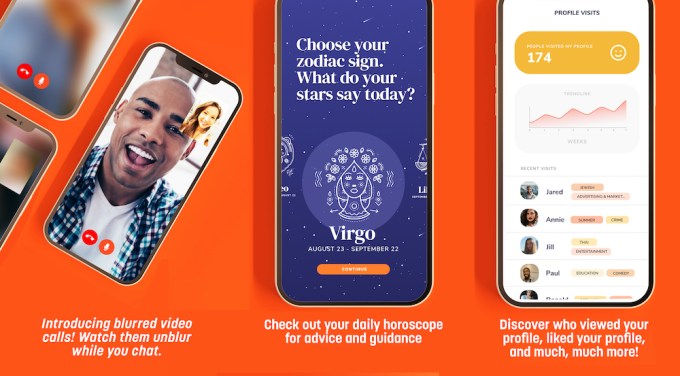
Image Credits: S’More
The new funding comes from a long list of investors: Benson Oak Ventures, Mark Pincus’ Workplay Ventures, Gaingels VC, Loud Capital/Pride Fund
SideCar Angels, AppLovin Chairman Rafael Vivas, Joshua Black of Apollo Management, Plus Grade CEO Ken Harris, Harvard geneticist George Church, former Meet Group CEO John Abbott, former IMAX CEO Brad Weschler, Aaron and Sharon Stern, Justen Stepka/Enterprise Fund, Boston Harbor Angels, Grit Daily CEO Jordan French, Kind.Fund founder Marty Isaac, Craig Mullett and Dating Group.
Cohen-Asletai told me the funding has already allowed him to hire what he’s calling a “founding team,” including chief architect Long Nguyen, head of operations Sneha Ramanchandran, head of product and design Regina Guinto and senior developer David Lichy.
S’More is also announcing that it has signed a production deal with producers Elvia Van Es Oliva and Jack Tarantino, who have worked on shows like “90 Day Fiancé.” Cohen-Asletai said the startup will work with them to create “anti-superficial” dating content for digital platforms and TV networks.
This deal builds on the success of S’More Live, the startup’s celebrity dating show on Instagram Live, which has aired 60 episodes so far.
“We’re using that show to build our brand, to gain awareness and then … we’re actually able to leverage all of the viewers and retarget them with content from S’More, which has made our cost to acquire a user [very affordable],” Cohen-Asletai said.
Powered by WPeMatico
Tapbots, the company behind Tweetbot, has released a major update for the iPhone and iPad. Tweetbot 6 is now available in the App store. While there aren’t a lot of visual changes, there are a couple of important things happening under the hood.
First, Tweetbot 6 is using Twitter’s API v2. An API is an interface that lets two applications or services interact with each other. In today’s case, Tweetbot uses Twitter’s API to interact with the service.
And third-party developers can only do what Twitter lets them do. For many years, Twitter’s API has been somewhat limited, especially if you’ve been trying to build a full-fledged Twitter client. But API v2 surfaces some missing features.
For instance, Tweetbot 6 can now display polls. Before that, polls simply didn’t appear in the timeline. Similarly, Tweetbot 6 displays preview cards, which let you preview linked content without having to click on them. Some features are still missing, such as stories.
There are some minor changes with Tweetbot 6, such as new interface themes, a new feature that lets you select Chrome or Firefox as browser options for links and some tweaks in the app design.
The business model is changing as well. Instead of paying to download the app, you can now download a free app with many restrictions — for instance, you can’t tweet. When you’re ready, you can subscribe to unlock all features for $0.99 per month or $5.99 per year.
This change should ensure the future of the app. Tapbots says Tweetbot 6 is currently in early access. The company plans to add more features down the road.
And if you’re using Tweetbot 5 right now, the app is still working fine. You can re-download the app from the ‘Purchased’ section in the App Store.
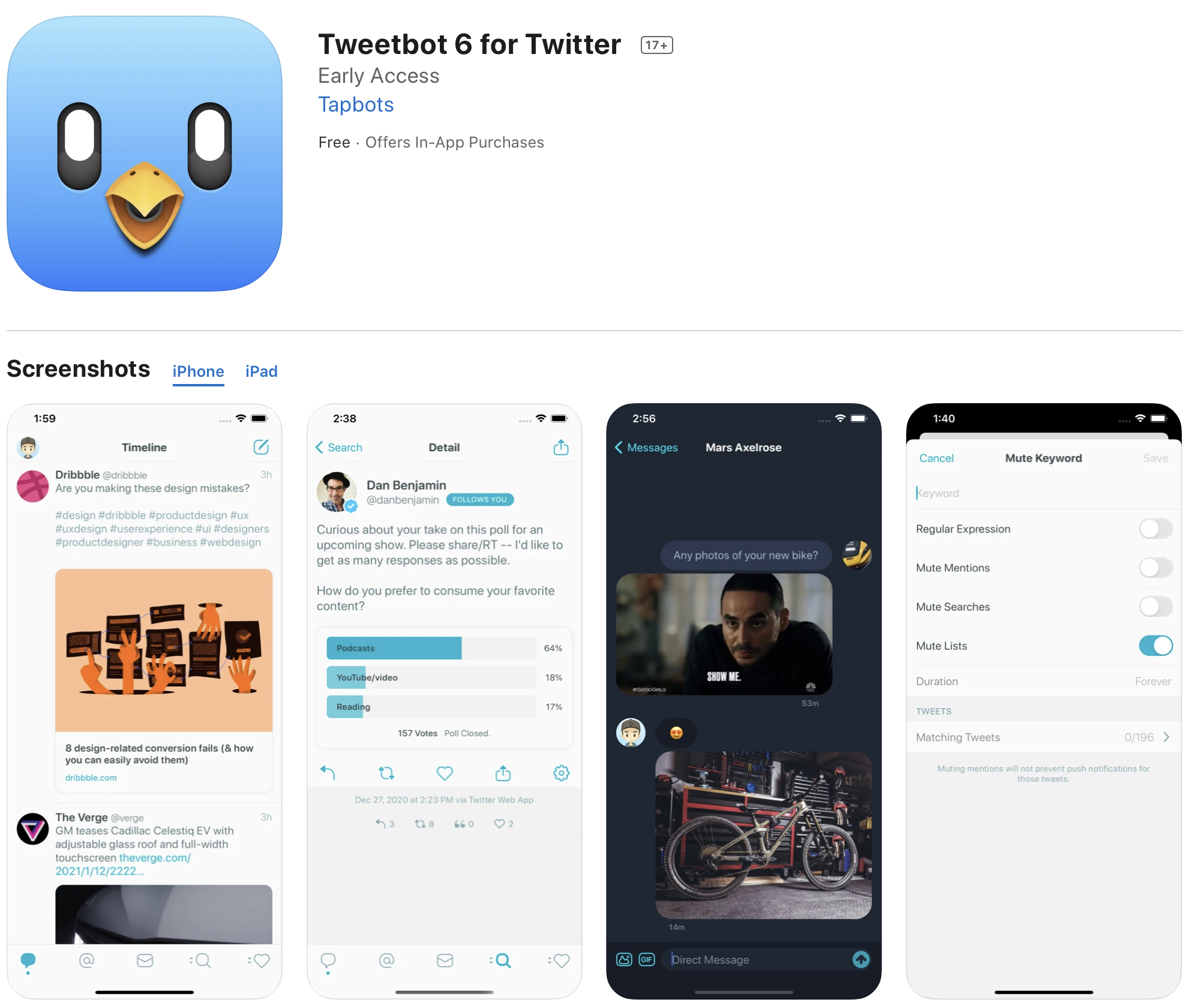
Powered by WPeMatico
Many people want to develop better screen-time habits, but don’t have a good set of tools to do so. A new startup, Opal, aims to help. The company, now backed by $4.3 million in seed funding, has developed a digital well-being assistant for iOS that allows you to block distracting websites and apps, set schedules around app usage, lock down apps for stricter and more focused quiet periods, and more.
The service works by way of a VPN system that limits your access to apps and sites. But unlike some VPNs on the market, Opal is committed to not collecting any personal data on its users or their private browsing data. Instead, its business model is based on paid subscriptions, not selling user data, it says.
Timed with its public debut, Opal also today announced its initial financing in a round led by Nicolas Wittenborn at Adjacent, a mobile-focused VC fund. Other investors included Harry Stebbings, Steve Schlafman, Alex Zubillaga, Kevin Carter, Thibaud Elziere, Jean-Charles Samuelian-Werve, Alban Denoyel, Isai, Secocha Ventures, Speedinvest, and others.

Image Credits: Opal, founder Kenneth Schlenker
The idea for Opal comes from Paris-based Kenneth Schlenker, a longtime technologist who previously founded and sold an art marketplace startup ArtList and later led mobility company Bird’s expansion in France.
Schlenker, who grew up in a small, quiet village in the Alps, says he got into technology at a young age.
“I sort of got obsessed, like many of us, by the potential of technology and its amazing power of attraction — making connections, learning new things, all sorts of incredible opportunities,” he explains. “But I’ve then spent the last 10 years and more trying to seek a balance between this need for connection and this need for disconnection.”
In more recent years, Schlenker came to realize that others were having the same problem, including those outside the tech industry. That drove him to build Opal, with the goal of helping people better achieve balance in their lives so they could reconnect with loved ones, spend time in nature or just generally go offline to focus on other areas of their lives.
At a basic level, Opal’s VPN allows users to block themselves from using dozens of distracting apps and sites for certain periods of time, including social media, news, productivity apps and more.
Social media, in particular, has been a huge problem in recent years, Schlenker says.
“In particular, Instagram, Facebook and Twitter — social media is where you feel like you’re learning something, and you feel like you’re connecting with people. So it’s good. But on the other hand, it’s very hard to stay intentional,” he explains. “It’s okay to pick up your phone and go to Instagram, but when you ‘wake up’ 30 minutes later, you usually feel really bad. You feel like, ‘where’s the time gone?’, ‘what did I just do?,’ ” he says.
Opal addresses this problem through a handful of features.
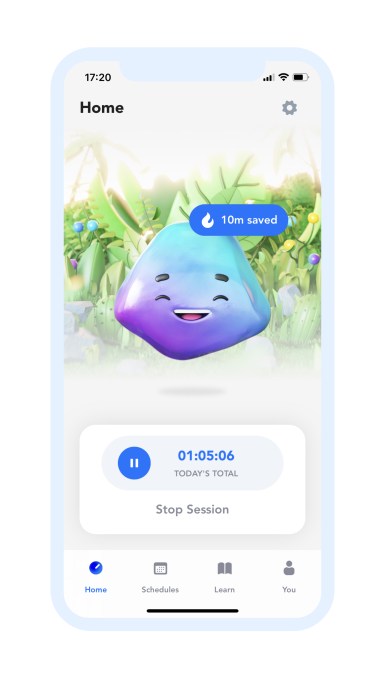
Image Credits: Opal
The free service allows you to block distracting websites and apps and take breaks throughout the day. By upgrading to the paid membership, Opal users can schedule time off from apps to establish recurring downtimes — whether that’s for family dinners or working hours, or anything else. They also can use a more extreme version of this feature called Focus Mode, which locks you out of apps in a way that’s not cancelable.
While the company is using a VPN to make this system work, it’s being transparent and straightforward about its data collection practices.
“There is zero private browsing data that leaves your phone,” Schlenker insists. “Anything you do on your phone outside of Opal’s app stays local on your phone and is never stored on any of our servers or any other servers. That’s very important to us,” he says.
From inside Opal’s app, the company claims it only collects usability and crash information — not browsing data. And the usability data is completely anonymized for another layer of privacy. Opal also doesn’t require an email to begin using the app. It only asks for one if you choose to pay.
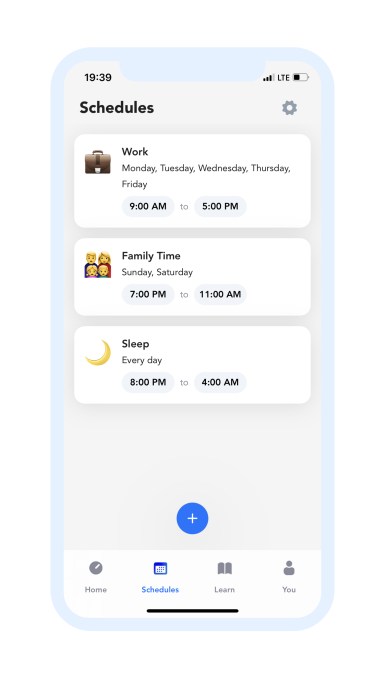
Image Credits: Opal
These core principles are also documented on Opal’s privacy page, and are why Schlenker believes his app won’t face the challenges that other screen-time apps on the App Store have experienced in the past.
As you may recall, Apple cracked down on the screen time app industry a couple of years ago — a move Apple said was focused on protecting user privacy, but has also been raised as a possible example of anticompetitive behavior. Many of the apps at the time had been using techniques Apple claimed put consumers’ privacy and security at risk, as they gave third-parties elevated access to users’ devices. This was particularly concerning because many of the impacted apps were marketed as parental control services — meaning the end users were often children.
Opal, meanwhile, is targeting adults, and perhaps teenagers, who want to develop better screen-time habits. It is not selling this as a parental control system, however.
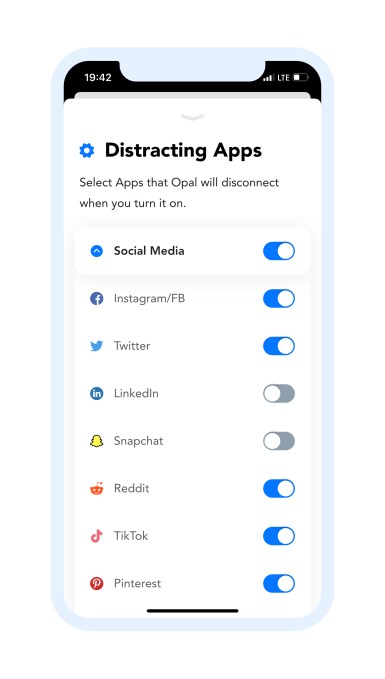
Image Credits: Opal
At launch, Opal can block over 100 apps and sites across several categories, including Facebook, Instagram, Snapchat, TikTok, Reddit, Pinterest, YouTube, Netflix, Twitch, Gmail, Outlook, Slack, Robinhood, WhatsApp, WeChat and others, including those in the news, adult and gambling categories.
Users can choose to block the apps for short breaks — 5, 10 or 60 minutes — throughout the day. You can also set an intention and set a timer before using an app, to help you avoid the issue of losing track of time. And you can set focus timers or scheduled times to automatically shut off app usage.
You can track your progress by viewing the “time saved” and you can share your successes across social media. In time, Schlenker plans to add more of a scoring mechanism to Opal that will help you stay accountable to your original goals.
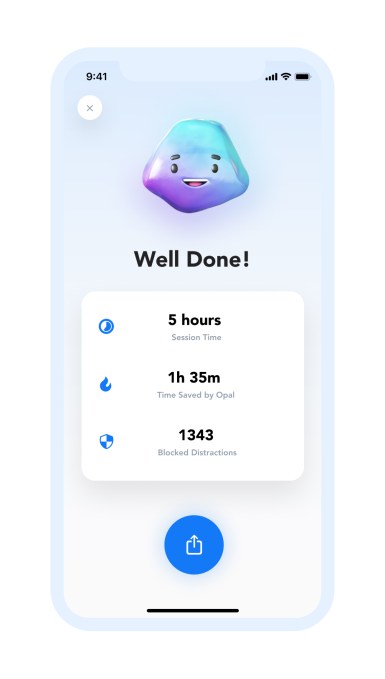
Image Credits: Opal
Though work on the app only began in 2020, Opal began attracting attention as it publicized its plans on Twitter and ran its private beta, which grew from hundreds to thousands of users this year, saving its users an average of two hours per day.
Though Schlenker had connections with many of the angel investors who have since backed Opal, he says the interest from institutional and larger investors was all inbound.
“It was not our intention to raise so much, so early,” Schlenker notes.
The funds will be used to help Opal grow its team, particularly engineering, design as well as product. The company will also soon launch a version of Opal for Chrome and later, Android, and will experiment with more social features around sharing and hosting group sessions.
The app is currently a free download on the App Store with an optional $59.99/year subscription plan.
Powered by WPeMatico
Goalsetter, a platform that helps parents teach their kids financial literacy, announced the raise of a $3.9 million seed round this morning, led by Astia.
PNC Bank, Mastercard, U.S. Bank, Northwestern Mutual Future Ventures, Elevate Capital, Portfolia’s First Step and Rising America Fund and Pipeline Angels also participated in the round. The round also saw participation from a handful of individual investors including Robert F. Smith, Kevin Durant, Chris Paul, Baron Davis, Sterling K. Brown, Ryan Bathe, CC Sabathia and Amber Sabathia.
Goalsetter launched in 2019 out of the Entrepreneurs Roundtable Accelerator. Founded by Tanya Van Court, who lost over $1 million in the 2001 bubble burst, the platform teaches financial literacy to children of all ages, helping them learn economic concepts, lingo and the principles of financial health.
After long stints at Nickelodeon and ESPN, Van Court understands deeply how kids learn and what keeps their attention. She vowed to make sure that her children were never ignorant of what it takes to protect their wealth and create more.
The app also allows parents to give allowances through the app, and even pay out their own specified amount for every quiz question the kid gets right in the app. Plus, family and friends can give “goal cards” instead of gift cards, helping kids save for the things they really want in the future.
The company recently launched a debit card for kids, as well, letting parents control the way the card is used and even lock it until their kids have passed the week’s financial literacy quiz.
Families save an average of $120 a month on the platform, and Van Court says that two families saved over $10,000 in the last year.
The company is also launching a massive campaign next week for Black History Month with the goal of closing the wealth gap among Black children and kids of color through financial education.
“It’s one thing to put a debit card into your teenager’s hands,” said Van Court. “That’s great. That teaches them how to spend money. It’s another thing to teach kids the core concepts about how to build wealth, or to know the difference between putting your money into an investment account, or putting your money into a CD versus a mutual fund versus a savings account. We teach what interest rates are, and what compound interest means. Our focus is on financial education because it’s not enough to teach kids how to spend.”
Goalsetter raised $2.1 million in 2019 and now adds this latest round to that for a total of $6 million raised. This latest round was oversubscribed, giving Van Court the opportunity to be super selective about her investors.
“Every single one of these investors has a demonstrated commitment prior to people marching in the streets in April, to social justice and to investing in diversity and inclusion initiatives and people,” said Van Court. “Every single one of them. That was really important because we were oversubscribed and we had the luxury of being able to pick who our investors were. Every one of the investors that we invited to our table were investors who we knew invited folks who look like us in 2019 and 2018 and 2017 to their table.”
Powered by WPeMatico
The line between social networking and gaming is increasingly blurring, and internet incumbents are taking notice. NetEase, the second-largest gaming company in China (behind Tencent), is among a group of investors who just backed IMVU, an avatar-focused social network operating out of California.
Menlo Park-based Structural Capital among other institutions that also joined in the strategic round totaling $35 million. IMVU has raised more than $77 million from five rounds since it was co-founded by “The Lean Startup” author Eric Ries back in 2004. The company declined to disclose its post-money valuation.
The fresh investment will be used to fund IMVU’s product development and comes fresh off a restructuring at the company. A new parent organization called Together Labs was formed to oversee its flagship platform IMVU, in which users can create virtual rooms and chat with strangers using custom avatars, a product that’s today considered by some a dating platform; a new service called Vcoin, which lets users buy, gift, earn and convert a digital asset from the IMVU platform into fiat; and other virtual services.
“NetEase operates some of the most successful, biggest in scale, and evergreen MMO [massively multiplayer online] games in China and they see in IMVU business highlights echoing theirs,” Daren Tsui, chief executive officer at Together Labs, told TechCrunch.
“IMVU operates one of the world’s oldest, yet most vibrant and young — in terms of our user base — metaverses. We have many shared business philosophies and complementary know-how. It is a natural fit for us to become partners,” he added.
Founded in 2005, NetEase is now known for its news portal, music streaming app, education products and video games that compete with those of Tencent. It has over the years made a handful of minority investments in companies outside China, though it’s not nearly as aggressive as Tencent in terms of investment pace and volume.
A NetEase spokesperson declined to comment on the investment in IMVU.
The partnership, according to Tsui, would allow the virtual networking company to tap NetEase’s game development and engineering capabilities as well as leverage NetEase’s knowledge in global market strategy as Together Labs launches future products, including one called WithMe.
In 2020, IMVU saw record growth, with over 7 million monthly active users and 400,000 products created every month by IMVU users. The service currently has a footprint in more than 140 countries and is “always looking to expand” in existing markets, including Asia, in which it already has a localized Korean app, according to Tsui.
“With IMVU’s accelerating growth over recent years, the launch of VCOIN, and the development of the new WithMe platform, we felt timing was right to bring all of these products under a new roof to reinforce our commitment for creating authentic human connections in virtual spaces,” said the chief executive.
Powered by WPeMatico
Buzzy live voice chat app Clubhouse has confirmed that it has raised new funding – without revealing how much – in a Series B round led by Andreessen Horowitz through the firm’s partner Andrew Chen. The app was reported to be raising at a $1 billion valuation in a report from The Information that landed just before this confirmation. While we try to track down the actual value of this round and the subsequent valuation of the company, what we do know is that Clubhouse has confirmed it will be introducing products to help creators on the platform get played, including subscriptions, tipping and ticket sales.
This funding round will also support a ‘Creator Grant Program’ being set up by Clubhouse, which will be used to “support emerging Clubhouse creators” according to the startup’s blog post. While the app has done a remarkable job attracting creator talent, including high-profile celebrity and political users, directing revenue towards creators will definitely help spur sustained interest, as well as more time and investment from new creators who are potentially looking to make a name for themselves on the platform, similar to YouTube and TikTok influencers before them.
Of course, adding monetization for users also introduces a method for Clubhouse itself to monetize. The platform is free to all users, and doesn’t yet offer any kind of premium plan or method of charging users, nor is it ad-supported. Adding ways for users to pay other users provides an opportunity for Clubhouse to retain a cut for its services.
The plans around monetization routes for creators appear to be relatively open-ended at this point, with Clubhouse saying it’ll be launching “first tests” around each of the three areas it mentions (tipping, tickets and subscriptions) over the “next few months.” It sounds like these could be similar to something like a Patreon built right into the platform. Tickets are a unique option that would go well with Clubhouse’s more formal roundtable discussions, and could also be a way that more organizations make use of the platform for hosting virtual events.
The startup also announced that it will be starting work on its Android app (it’s been iOS only for now) and that it will also invest in more backend scaling to keep up with demand, as well as support team growth and tools for detecting and prevuing abuse. Clubhouse has come under fire for its failure in regards to moderation and prevention of abuse in the past, so this aspect of its product development will likely be closely watched. The platform will also see changes to discovery aimed at surfacing relevant users, groups (‘clubs’ in the app’s parlance) and rooms.
During a regular virtual town hall the app’s founders host on the platform, CEO Paul Davison revealed that Clubhouse now has 2 million weekly active users. It’s also worth noting that Clubhouse says it now has “over 180 investors” in the company, which is a lot for a Series B – though many of those are likely small, independent investors with very little stake.
Powered by WPeMatico
Welcome back to This Week in Apps, the weekly TechCrunch series that recaps the latest in mobile OS news, mobile applications and the overall app economy.
The app industry is as hot as ever, with a record 218 billion downloads and $143 billion in global consumer spend in 2020.
Consumers last year also spent 3.5 trillion minutes using apps on Android devices alone. And in the U.S., app usage surged ahead of the time spent watching live TV. Currently, the average American watches 3.7 hours of live TV per day, but now spends four hours per day on their mobile devices.
Apps aren’t just a way to pass idle hours — they’re also a big business. In 2019, mobile-first companies had a combined $544 billion valuation, 6.5x higher than those without a mobile focus. In 2020, investors poured $73 billion in capital into mobile companies — a figure that’s up 27% year-over-year.
This week, we’re looking into how President Biden’s inauguration impacted news apps, the latest in the Parler lawsuit, and how TikTok’s app continues to shape culture, among other things.
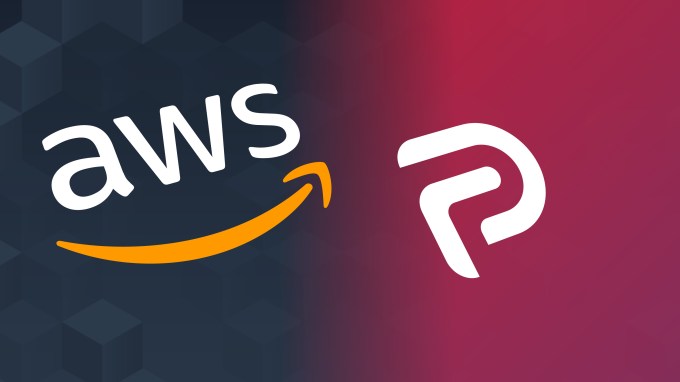
Logos for AWS (Amazon Web Services) and Parler. Image Credits: TechCrunch
U.S. District Judge Barbara Rothstein in Seattle this week ruled that Amazon won’t be required to restore access to web services to Parler. As you may recall, Parler sued Amazon for booting it from AWS’ infrastructure, effectively forcing it offline. Like Apple and Google before it, Amazon had decided that the calls for violence that were being spread on Parler violated its terms of service. It also said that Parler showed an “unwillingness and inability” to remove dangerous posts that called for the rape, torture and assassination of politicians, tech executives and many others, the AP reported.
Amazon’s decision shouldn’t have been a surprise for Parler. Amazon had reported 98 examples of Parler posts that incited violence over the past several weeks before its decision. It told Parler these were clear violations of the terms of service.
Parler’s lawsuit against Amazon, however, went on to claim breach of contract and even made antitrust allegations.
The judge shot down Parler’s claims that Amazon and Twitter were colluding over the decision to kick the app off AWS. Parler’s claims over breach of contract were denied, too, as the contract had never said Amazon had to give Parler 30 days to fix things. (Not to mention the fact that Parler breached the contract on its side, too.) It also said Parler had fallen short in demonstrating the need for an injunction to restore access to Amazon’s web services.
The ruling only blocks Parler from forcing Amazon to again host it as the lawsuit proceeds, but is not the final ruling in the overall case, which is continuing.
@livbedumb♬ drivers license – Olivia Rodrigo
We already knew TikTok was playing a large role in influencing music charts and listening behavior. For example, Billboard last year noted how TikTok drove hits from Sony artists like Doja Cat (“Say So”) and 24kGoldn (“Mood”), and helped Sony discover new talent. Columbia also signed viral TikTok artists like Lil Nas X, Powfu, StaySolidRocky, Jawsh 685, Arizona Zervas and 24kGoldn. Meanwhile, Nielsen has said that no other app had helped break more songs in 2020 than TikTok.
This month, we’ve witnessed yet another example of this phenomenon. Olivia Rodrigo, the 17-year-old star of Disney+’s “High School Musical: The Musical: the Series” released her latest song, “Drivers License” on January 8. The pop ballad and breakup anthem is believed to be referencing the actress’ relationship with co-star Joshua Bassett, which gave the song even more appeal to fans.
Upon its release the song was heavily streamed by TikTok users, which helped make it an overnight sensation of sorts. According to a report by The WSJ, Billboard counted 76.1 million streams and 38,000 downloads in the U.S. during the week of its release. It also made a historic debut at No. 1 on the Hot 100, becoming the first smash hit of 2021.
On January 11, “Drivers License” broke Spotify’s record for most streams per day (for a non-holiday song) with 15.17 million global streams. On TikTok, meanwhile, the number of videos featuring the song and the views they received doubled every day, The WSJ said.
Charli D’Amelio’s dance to it on the app has now generated 5 million “Likes” across nearly 33 million views, as of the time of writing.
@charlidamelio♬ drivers license – Olivia Rodrigo
Of course, other TikTok hits have broken out in the past, too — even reaching No. 1 like “Blinding Lights” (The Weeknd) and “Mood” (24kGoldn). But the success of “Drivers License” may be in part due to the way it focuses on a subject that’s more relevant to TikTok’s young, teenage user base. It talks about first loves and being dumped for the other girl. And its title and opening refer to a time many adults have forgotten: the momentous day when you get your driver’s license. It’s highly relatable to the TikTok crowd who fully embraced it and made it a hit.
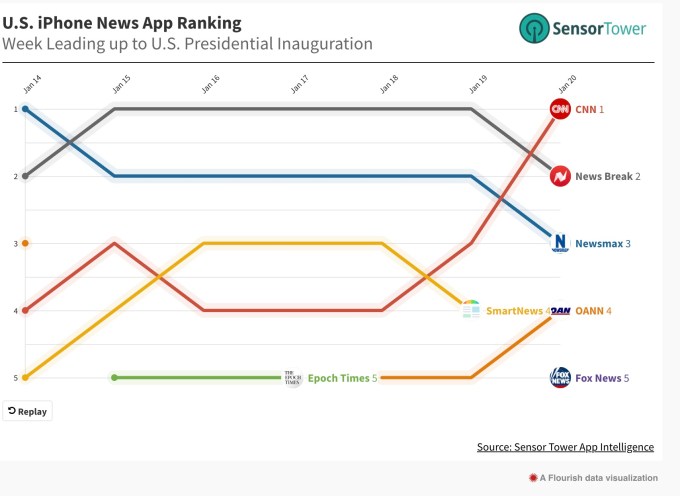
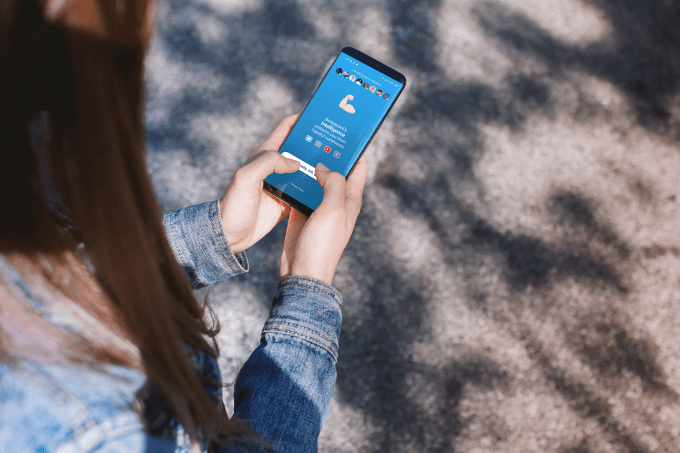
Image Credits: Bodyguard
A French content moderation app called Bodyguard, detailed here by TechCrunch, has brought its service to the English-speaking market. The app allows you to choose the level of content moderation you want to see on top social networks, like Twitter, YouTube, Instagram and Twitch. You can choose to hide toxic content across a range of categories, like insults, body shaming, moral harassment, sexual harassment, racism and homophobia and indicate whether the content is a low or high priority to block.
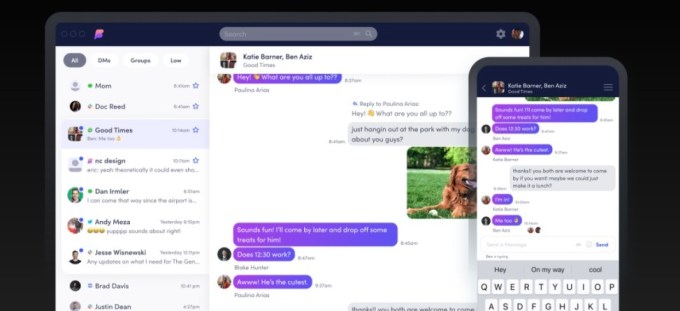
Image Credits: Beeper
Pebble’s founder and current YC Partner Eric Migicovsky has launched a new app, Beeper, that aims to centralize in one interface 15 different chat apps, including iMessage. The app relies on an open-source federated, encrypted messaging protocol called Matrix that uses “bridges” to connect to the various networks to move the messages. However, iMessage support is more wonky, as the company actually ships you an old iPhone to make the connection to the network. But this system allows you to access Beeper on non-Apple devices, the company says. The app is slowly onboarding new users due to initial demand. The app works across MacOS, Windows, Linux, iOS and Android and charges $10/mo for the service.
Powered by WPeMatico